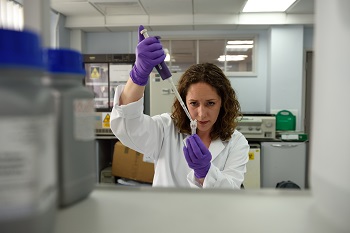Jun 18 2015
A new material which could increase protection against antibacterial and antifungal infection for weeks, months or years has been developed by researchers at the University of Bristol.

The technology is likely to have significant impact across a number of areas including dentistry, where one in seven composite fillings fail within seven years and 86 per cent of these failures are caused by bacterial infection.
Developed by Dr Michele Barbour and her research group in the University’s School of Oral and Dental Sciences, Pertinax is a new formulation of chlorhexidine. Chlorhexidine is a proven antimicrobial agent, used widely to prevent and treat a range of infections, but in its traditional formulation is effective for only a very short length of time.
Pertinax increases chlorhexidine’s uses by improving its persistence where it is applied. As a result of its novel formulation as a slow release antimicrobial nanoparticle, Pertinax has an unusually low solubility which can provide a continuous slow release over a controlled period of time. This innovation has won Dr Barbour and Pertinax the £25,000 Materials Science Venture Prize awarded by The Worshipful Company of Armourers and Brasiers.
Pertinax can greatly extend the active lifetime of chlorhexidine, enabling it to provide reliable protection against infection for very much longer than was previously possible. This opens up a range of new potential applications, as well as the opportunity to make existing products more effective.
Dr Barbour, Senior Lecturer in Biomaterials in the School of Oral & Dental Sciences.
Our initial focus will be in the dental market. Research shows there is a clear need for long-acting antimicrobial products used in fillings and cements for crowns, bridges and orthodontic braces which will treat and prevent persistent bacterial infections over a much longer time frame than is currently possible.
Dr Barbour
“This is a significant development which should help prevent some hard to treat infections affecting millions of people,” said Professor Bill Bonfield, chairman of the Armourers & Brasiers Venture Prize judging panel. “Our prize looks to encourage scientific entrepreneurship in the UK and provide funding, which is often difficult to source, to help bring new developments like this to market.”
Pertinax has brought in Ashley Cooper, an experienced life sciences chief executive to guide the development of the technology and the company.
He said: “Aside from dentistry there are a number of other areas where Pertinax could have a key role. This includes catheters and wound care products, which are especially prone to infection by antibiotic-resistant bacteria such as MRSA.”
We will be using the Venture Prize award money to help us develop a robust and scalable manufacturing process. At the moment we are working with gram quantities and we need to scale this to kilogram and beyond for commercial application.
Dr Barbour